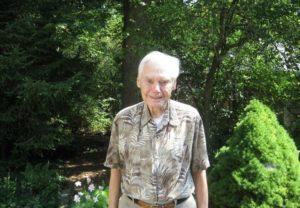Celebrate PRIDE, but keep pushing
by Craig Dresang, CEO
June 18, 2022

Harry Root was 86 when I first met him. He was always cheerful and despite his age and many ailments he moved about his business like a slightly injured Energizer Bunny with ruffled white hair. Even in the middle of his ninth decade, he was focused, determined and joyfully generous. It was not unusual to see him shuffling around in his garage, packing and moving boxes of treasures that he intended to give away to his favorite charities.
His life-partner of 40 years, Curtis Chapin Palmer, had been cared for by hospice 20 years earlier. The two men first met behind enemy lines during World War II and they eventually fell in love. From that point on, they lived their lives together in secret.
Harry credited his late partner Curtis with contributing significantly to his own personal development. He said, “Curtis came from a wealthy and educated family. In a sense, we were from different planets. He had to teach me basic things like how to set a table. Over time, he taught me how to be a gentleman.” The collective life they built was visibly marked by a deep love and affection for one another.
During the course of my visits, I learned that Harry was the man who first discovered Buchenwald, one of the largest Nazi concentration camps on German soil. As a result, Harry also became the man who would one day lead the riderless horse for Gen. George Patton’s funeral in Washington, D.C. In his own words, Harry described himself as growing up dirt-poor and unpolished. Even so, he said, “If you turn adversity into ambition, the possibilities are limitless.”
And that’s exactly what Harry did. When he returned from the war, he took a job in the mail room at Marshall Field’s department store, went to school at night, and eventually received an MBA from the University of Chicago. Over time, his ambition landed him a seat as an officer and senior vice president at Marshall Field’s.
In his final five months, Harry once again turned his adversities and fears into opportunities to express love to friends and family, show support for causes that were important to him, and share his stories and lessons with those who were fortunate enough to be in his circle.
But one of the truths about Harry’s life that seemed so unjust and unfair, was the pressure he felt to keep his relationship with Curtis under a veil. When he was first diagnosed with leukemia, he called me to ask if our hospice and palliative care organization was set up to honor the wishes, values and relationships of an elderly gay man who needs end-of-life care. We were not quite sure what he meant by that inquiry, but as we developed a closer relationship it became clear that neither he nor his partner Curtis experienced the same kind of dignity and respect afforded to straight couples during their decades-long healthcare journeys.
Decades of progress related to LGBTQ+ rights aside, it is still common for a gay or trans man or woman to utter these words: “The love of my life is dying and I can’t say we are married.” Clinicians who work in end-of-life care often see this dynamic at play … especially among older members of the LGBTQ+ community.
Fear, isolation and discrimination are a reality for many Americans who identify as lesbian, gay, bisexual and transgender. Discrimination, refusal of care, bias, erroneous assumptions and derogatory statements towards LGBT persons have been reported in 70 percent of healthcare visits in the United States, according to the Institute of Medicine.
Some have selectively hidden their identity to escape judgement, intolerance, prejudice, and even violence. The hesitancy to be open and transparent stems from deeply hurtful real-life experiences someone has encountered from their own families, churches, employers, and neighbors. Society still has not made enough assurances that it is safe for someone to be who they are, or to openly be their authentic selves.
Research shows that many LGBTQ+ people avoid accessing healthcare and psychosocial support because they have lived through a history peppered with negative experiences. As the musician James Taylor puts it in his 1970 hit Country Roads, “we’d have to be some kind of natural born fool to want to pass that way again.”
Healthcare providers and institutions are sometimes uncomfortable with sexual orientation, gender identity and expression issues, so they often do not inquire or explore these matters with patients. By not asking, LGBTQ+ patients become more fearful about being open. They begin to wonder if their identity might limit their ability to receive equal or safe treatment. They also question if their designated powers of attorney for healthcare will be disrespected or ignored by healthcare staff.
Unfortunately, those fears are often warranted. According to a 2020 survey of care providers by Gary L. Stein of Yeshiva University, 53.6 percent thought that lesbian, gay, or bisexual patients were more likely than non-LGBTQ+ patients to experience discrimination at their institution; 23.7 percent actually observed discriminatory care; 64.3 percent said transgender patients were more likely than non-transgender patients to experience discrimination; 21.3 percent observed discrimination to transgender patients; 15 percent observed the significant other of an LGBTQ+ patient having their treatment decisions disregarded or minimized; and 14.3 percent observed the partner or surrogate of an LGBTQ+ patient being treated disrespectfully.
In 2018, AARP found that 57 percent of the LGBTQ+ community is concerned about healthcare providers not being sensitive to their needs as they age. One out of ten LGBTQ+ patients have been denied healthcare or provided inferior care, and 15 percent fear receiving health services outside the LGBTQ+ community. According to Carole Fisher, president of the National Partnership for Healthcare and Hospice Innovation (NPHI), “We must be active in the conversation about what high-quality, person-oriented end-of-life care for members of the LGBTQ+ community should look like. No one should have to hide who they are out of fear of receiving inadequate hospice, palliative, or long-term care.”
There is a story Harry occasionally shared about his fear of dying during the war. In a moment of terror, he made a pact with whatever god was listening. If he survived, he promised he would embrace honesty, generosity and curiosity as the foundations of his life. He lived a long and full life, and those who knew him would agree that he kept his part of the bargain.
Before he died, Harry told his hospice team that they would do well to spread their unique brand of dignity, respect and compassion throughout all of healthcare. They agreed … and they continue to carry that torch for Harry and for the larger community that he represents.





M. Jackson
Thank you Harry and Curtis’s story. As a black, gay man, not only have I experienced racial discrimination my entire life, but also discrimination for being gay, even from my own racial group. I learned and continue to learn to surround myself around people your can embrace love, kindness and honesty, for they are the ones who usually will honor and freeing give back these attributes to anyone, without seeking something in return. Until my road ends, I will use Harry and Curtis’ story as another guide for my everyday living. Thank you for sharing.
Gia Martucci
Hi M. Jackson, thank you so much for sharing your perspective and experiences with us!
face serum
I absolutely agree with this perspective. While it is important to celebrate and honor the progress that has been made during PRIDE, we must also recognize that there is still so much work to be done to ensure equality and justice for the LGBTQ+ community. We must continue to push for policies and societal changes that create a safer and more inclusive environment for all LGBTQ+ individuals. YoloCares’ message is a reminder that we cannot become complacent, and must continue to advocate for progress.